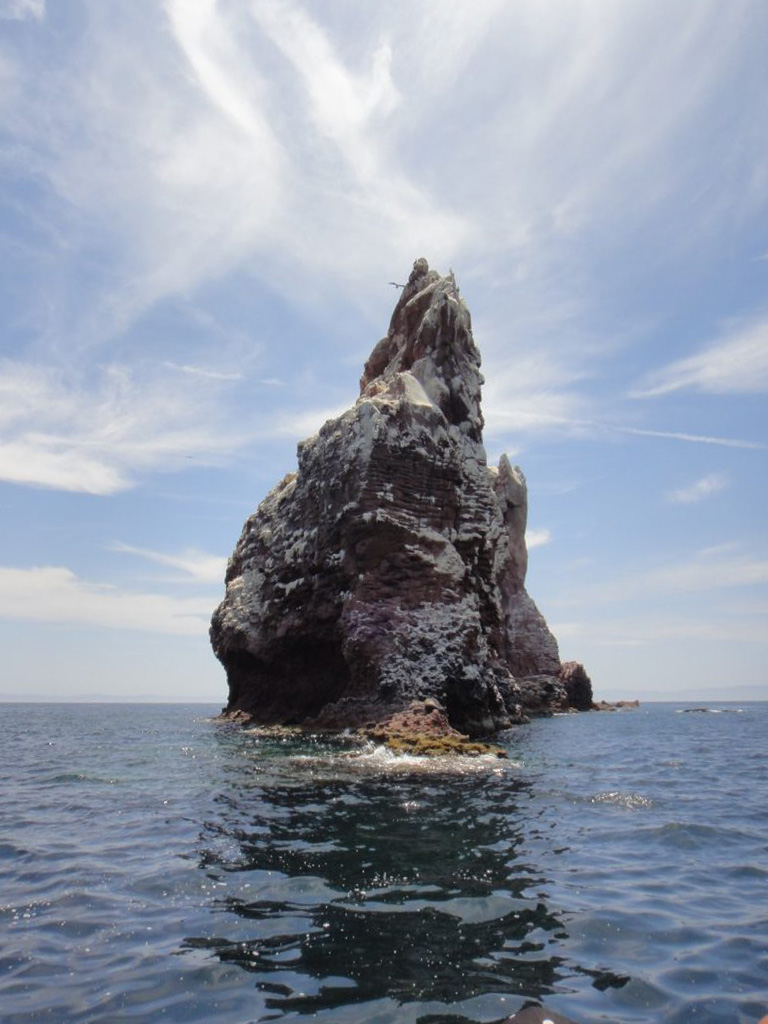A Community Chooses Dialogue Over Revenge
by Nathan Senge
On the night of May 19th, 2011, someone picked up a baseball-sized rock and whipped it through the windshield of one of the Citizen Observatory (CO) pick-up trucks. This person then cut the truck’s tires, keyed its doors, and fled.
The CO workers had been on a surveillance round in the bay, protecting clams and scallops from being fished illegally. No could identify the dissenter, but the incident made it more clear than ever that long-term visions are no good without short-term survival strategies.
Ever since 2008, when the nonprofit NOS (Noroeste Sustentable) moved its campus downtown to the Manglito fishing neighborhood, local fishers have been joining in their operations to restore the Callo de Hacha penshell clam and Catarina scallop fisheries in the Ensenada de la Paz bay. They formalized their commitment to restoration by creating the Citizen Observatory (CO) on June 20, 2009, which was designed to protect the bay from illegal fishing. For the first time ever, fishers from all over the Manglito community and beyond pledged to abstain from the one pursuit they earned a living by for the good of the bay’s recovery.
But vision comes with a cost. The success of the CO depends entirely upon providing alternative income for the fishermen who run it. But what about all those fishermen in the community who cannot be provided for?

The violent vandalism of the CO truck threw the community into uproar and fear. Up to this point, the CO had claimed to have saved more that 700 tons of fish from being illegally caught, with an approximate value of 5 million USD. The community had been proud of this success, had moved closer to its first potential harvest of the Callo de Hacha in over a decade, and now they had no idea how to proceed.
“We must find them and punish them,” some said, declaring that these types of vigilante acts could not be tolerated without unleashing a torrent of crime.
“We must quit the project—it is tearing the community apart,” said others.
But Liliana Gutiérrez Mariscal, NOS’s co-director, says that before either of these polarized options could gain ground, the team returned to its dialogue circle. There they sat with the pain of this act, and all the community strife it symbolized.
“It was hard,” Liliana says. “A lot came up in those circles. The pain of committing to not fishing the bay. The trust the community was trying to build. The difficulty of seeing a new future into being. And here were some outsiders who disrespected the whole thing. But that’s when things started to change, when the group realized that they thought of those people as outsiders. That was wrong. They were members of the community, after all. The fact that they were considered outsiders was the whole mistake.”
So the community formed OPRE (Organización de Pescadores Rescatando la Ensenada/Fishers’ Organization to Rescue the Ensenada), a new cooperative of local fishermen pledged to the clam and scallop restoration projects of NOS. By 2018, this involved over a hundred fishermen and their families, and had successfully overseen the growth of over three million clams and a hundred thousand scallops in the Ensenada (both of which were nearly extinct before). The movement has been such a success that the first commercial harvest of the Callo de Hacha in over a decade finally took place in the summer of 2017, and the catch far exceeded expectations.
This has been a defining moment for the community—for the first time since the fishermen agreed not to fish, they are finally able to earn a real income from their trade once again. And this is because they did not retaliate, but went into difficult dialogue and pledged not to abandon their community. As senior fisherman Hubert Mendéz says, “trust comes slowly, but it does come, if you stay vigilant and trust in the community itself.”
As that vigilance and trust continues to build, NOS has been able to create a whole new wing, ACHAMAR (to be ‘hacha’ in Spanish is slang for being really good at something and ‘mar’ is the ‘ocean’), to handle the branding and vending of the Callo de Hacha product.
In sum, for the first time ever, the Manglito fishing community is poised to fish in a way that sustains not only itself but the bay on which its survival depends—in perpetuity.
Nathan Senge is a Contributing Writer for the Academy for Systems Change. He holds a summa cum laude B.A. from Dartmouth College in Chemistry and Physics, and a M.A. in Journalism and Media Studies from the University of Colorado at Boulder.
